charlesnoble
-

How Solar Energy Actually Works in Your Home (And Why Storage Changes Everything)
Capture sunlight with photovoltaic panels that convert solar radiation into direct current electricity through semiconductor technology. Position your panels at the optimal angle for your latitude—typically between 30 and 45 degrees in most locations—to maximize energy absorption throughout the day. Store excess electricity in deep-cycle lithium or lead-acid batteries, which act as your energy reservoir…
-
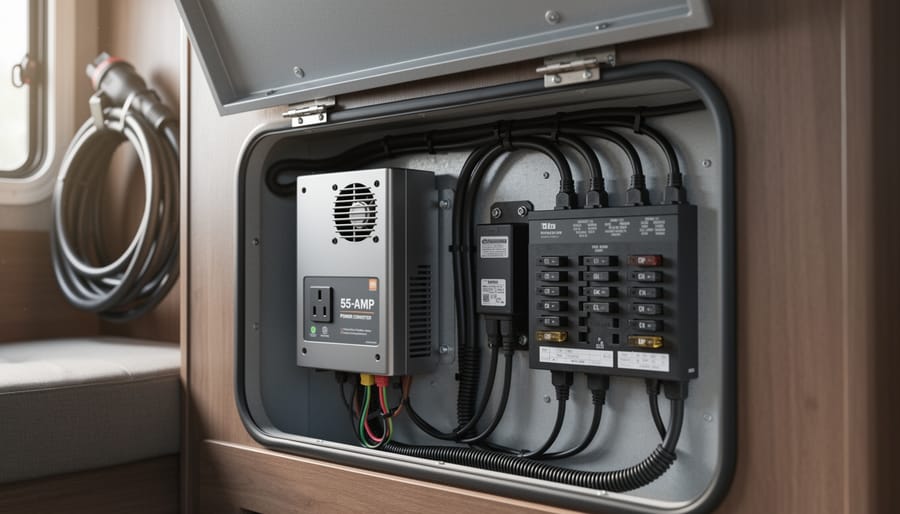
Why Your RV Battery Dies Overnight (And How a 55 Amp Converter Fixes It)
Your RV’s lights are flickering, the refrigerator isn’t keeping food cold, and your phone charger barely works. Sound familiar? That frustrating power struggle often points to an undersized or failing power converter, and upgrading to a 55 amp RV power converter might be exactly what you need. Here’s what’s happening: Your RV’s converter transforms 120-volt…
-

Solar Driveway Lights That Actually Work (No Electrical Bills Required)
Picture this: You’re pulling into your driveway after dark, and instead of fumbling for a flashlight or navigating by memory, your path is illuminated by a gentle row of lights that cost you absolutely nothing to operate. No electrician bills, no trenching through your yard, and no spike in your monthly utility costs. That’s the…
-
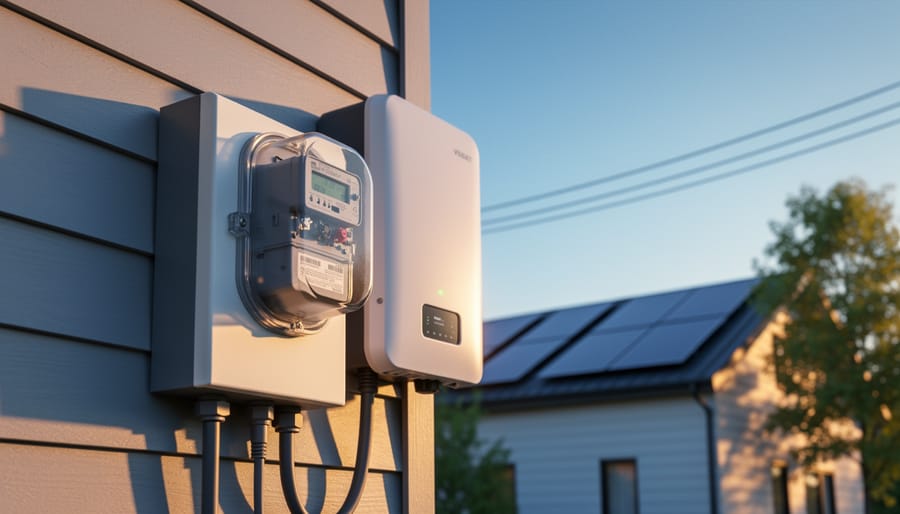
Why Grid-Tie Solar Inverters Are Your Gateway to Energy Independence (Without Breaking the Bank)
Grid-tie solar inverters transform your solar panels’ DC electricity into AC power that feeds directly into your home’s electrical system and the utility grid, eliminating the need for expensive battery banks while letting you earn credits for excess power you generate. When your panels produce more electricity than you’re using, the surplus flows back to…
-

Why Lithium-Ion Batteries Changed Everything About Solar Storage (And What You Need to Know)
Match your battery’s voltage to your solar panel system—12V, 24V, or 48V configurations must align perfectly, or you’ll waste energy through conversion losses and potentially damage expensive equipment. Check the battery’s amp-hour (Ah) rating against your daily power consumption: multiply your total watt-hours by 1.2 to account for inefficiency, then divide by your system voltage…
-
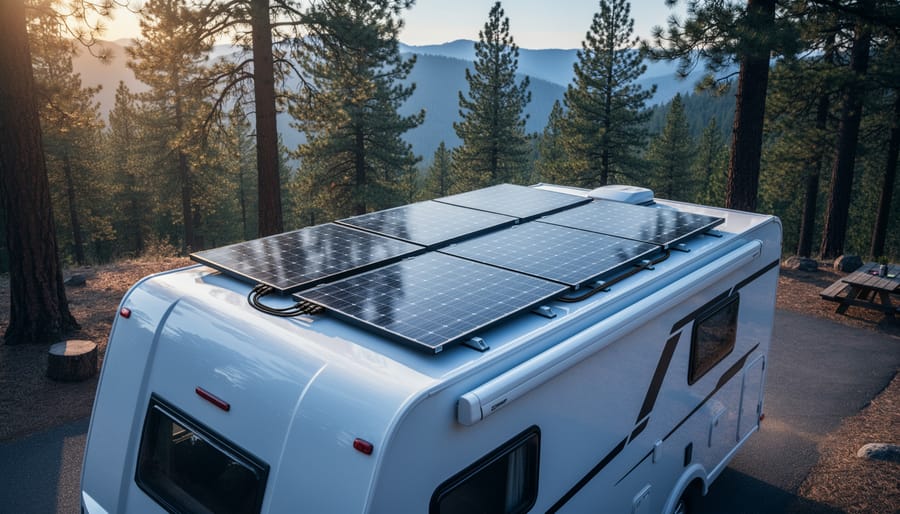
Why Series-Parallel Is the Sweet Spot for Small Solar Setups
Connect two panels in series to double your voltage, then wire two of these series pairs in parallel to maintain higher voltage while increasing your amperage—this series-parallel configuration gives you the sweet spot between performance and practicality for most small-scale solar setups. I learned this the hard way during my first RV solar installation when…
-
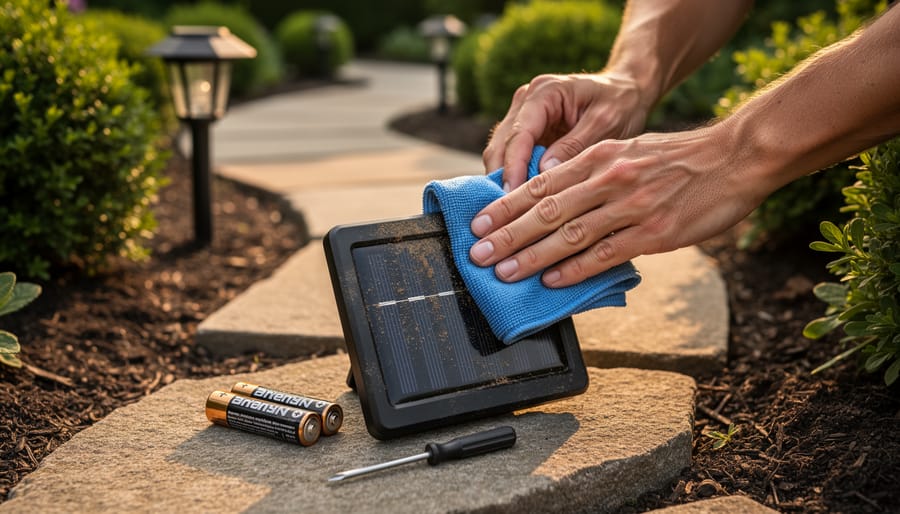
Why Your Solar Lights Stop Working (And How to Fix Them Fast)
Check the solar panel first by wiping away dirt, leaves, and debris that block sunlight absorption. A grimy panel is the number one reason solar lights stop working, and a simple cleaning with soapy water restores function in about 60% of cases. While you’re at it, reposition any lights that have shifted into shaded areas…
-
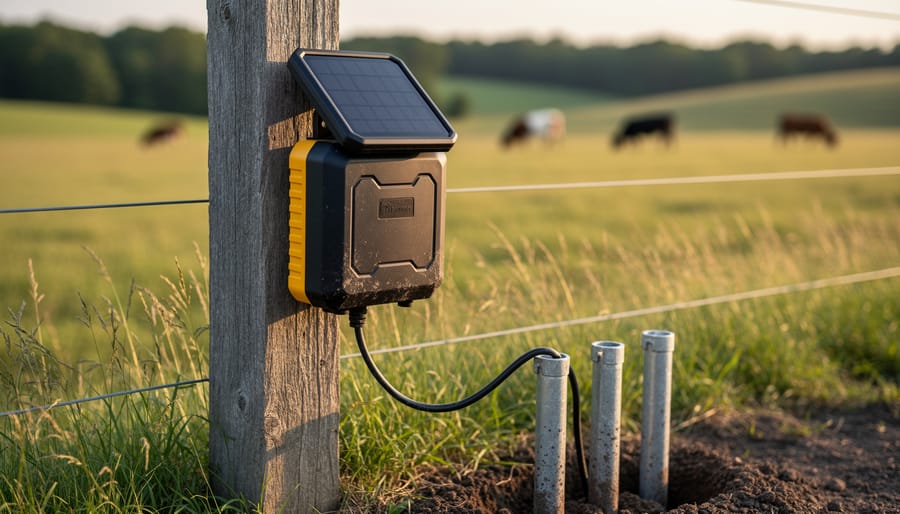
How Far a 5 Mile Solar Fence Charger Actually Reaches (And Which One You Need)
Understand that the “5 mile” rating on solar fence chargers doesn’t mean your fence will shock animals five miles away—it refers to the maximum length of wire the charger can energize under perfect conditions. In reality, expect effective coverage for 2-3 miles of actual fencing once you factor in vegetation touching the fence, wire gauge,…
-

Why Your RV Solar Panels Aren’t Charging (And How to Fix Voltage Drops)
Check your multimeter readings at each connection point along your solar charging path—from panels to charge controller to battery—to pinpoint exactly where voltage disappears. Most RV solar systems lose 10-30% of their potential power to voltage drop, but this invisible thief often goes undetected until you systematically measure and compare voltages at every junction. Start…
-
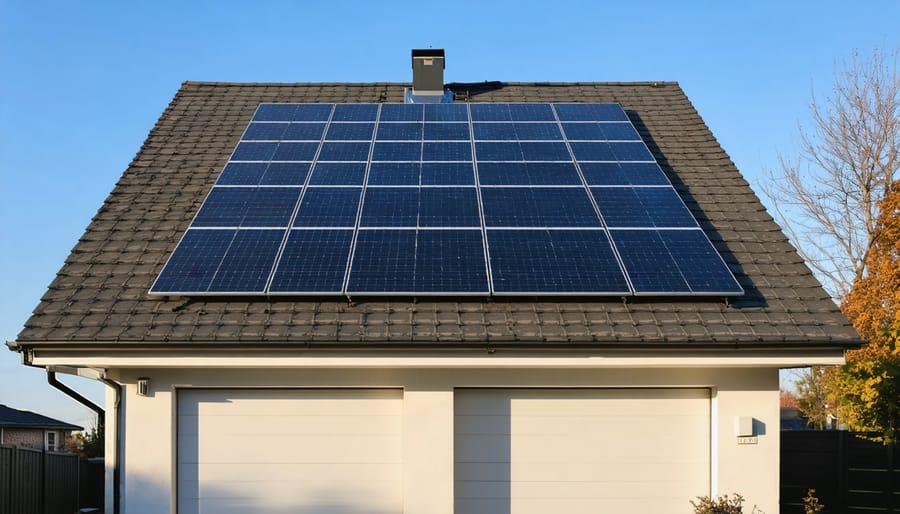
How Many kWh Does Your Solar System Actually Need? (Real Numbers for Real Homes)
Calculate your daily energy consumption by checking your utility bill for the monthly kilowatt-hour (kWh) usage, then divide by 30 to get your average daily number. This single figure becomes your North Star for sizing any solar system, whether you’re powering a full household, weekend cabin, or portable camping setup. Multiply your daily kWh by…
-
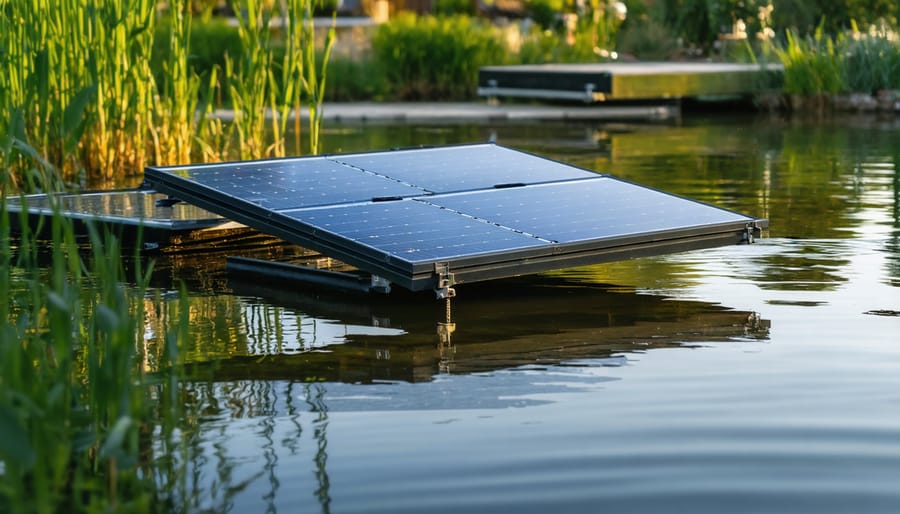
Floating Solar Panels Could Change Where You Generate Power
Picture your backyard pond doing double duty: supporting wildlife while generating clean electricity for your home. That’s the promise of floating solar panels, an innovation that’s transforming how we think about renewable energy installation. Floating solar systems, also called floatovoltaics, mount photovoltaic panels on buoyant platforms that rest on water surfaces. While utility companies are…
-
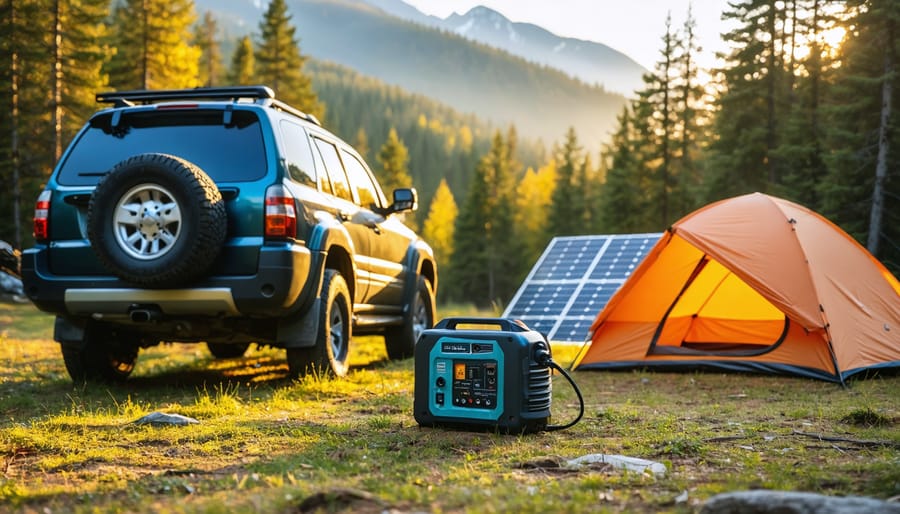
Why Quiet Camping Generators Beat Solar (And When They Don’t)
Choose a generator rated at 50-55 decibels or lower to ensure peaceful camping without disturbing wildlife or neighboring campers—models with inverter technology automatically adjust engine speed based on power demand, reducing noise significantly compared to conventional generators. Look for four-stroke engines with enclosed designs and rubber mounting feet that absorb vibration, as these engineering features…
-

Why Your Solar Watch Needs Different Care Than Regular Timepieces
Protect your solar watch investment by exposing the dial to bright light for at least 8 hours monthly, even when fully charged. This prevents the lithium battery from deep discharge, which permanently reduces its lifespan. Position your watch near a window during work hours or wear it outdoors regularly to maintain optimal charge levels. Clean…
-
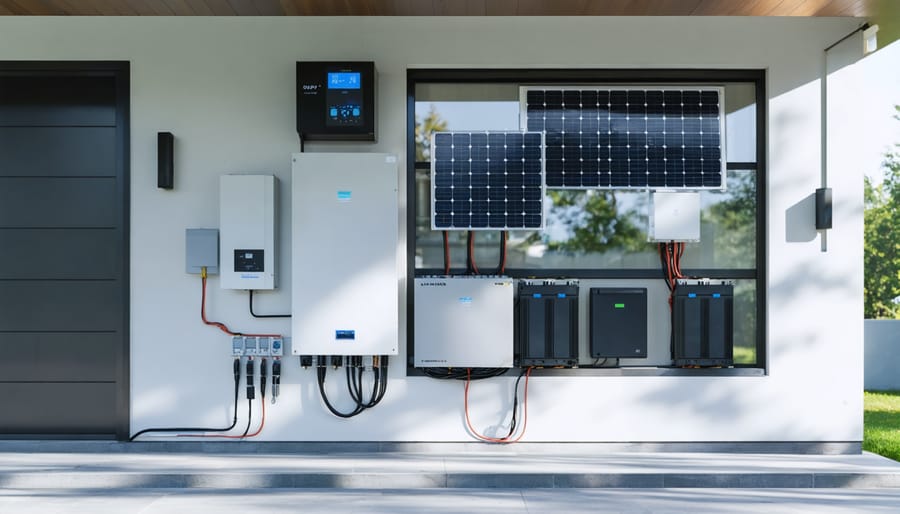
Every Component Your Solar Panel System Actually Needs (And What They Really Do)
Picture this: you’re standing in front of a solar panel, ready to harness free energy from the sun, but you’re not quite sure what else you need to make it actually work. I’ve been there. When I first started tinkering with solar in my garage, I quickly learned that panels are just one piece of…
-

Economic Growth vs. Environmental Protection: Finding the Balance
In the global conversation about progress, one debate continually takes center stage: Economic Growth vs. Environmental Protection. While nations strive to expand industries, build infrastructure, and improve standards of living, these developments often place strain on the natural environment. The challenge lies not in choosing one over the other, but in striking a balance between…
-

Why Glazed Solar Pool Heaters Outperform Everything Else (And Cost Less Than You Think)
Understand that glazed solar pool heaters are built with a glass or polycarbonate cover over dark absorber plates, creating an insulated greenhouse effect that captures and retains heat far more efficiently than unglazed alternatives. This design makes them capable of extending your swimming season by months, even in cooler climates where temperatures regularly dip below…
-

Stop Frying Your Batteries: How to Size Your Solar Charge Controller in 3 Simple Steps
Multiply your solar panel wattage by 1.25, then divide by your battery voltage—that’s your minimum charge controller amperage. A 400-watt solar array feeding a 12-volt battery bank needs at least a 42-amp controller (400 × 1.25 ÷ 12 = 41.67). This calculation accounts for real-world conditions where panels sometimes exceed their rated output on crisp,…
-
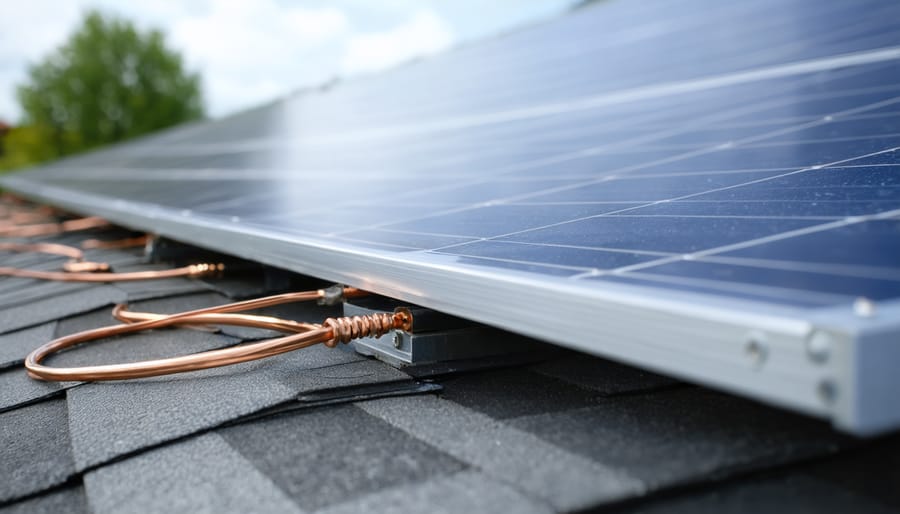
Why Your Solar Array Needs Proper Grounding (Before Lightning Teaches You)
Connect your solar array’s metal frame to a grounding rod driven at least eight feet into the earth near your installation. This creates a safe path for electrical faults and lightning strikes to dissipate harmlessly into the ground instead of through your home’s wiring or, worse, through you. Install grounding lugs on every solar panel…
-
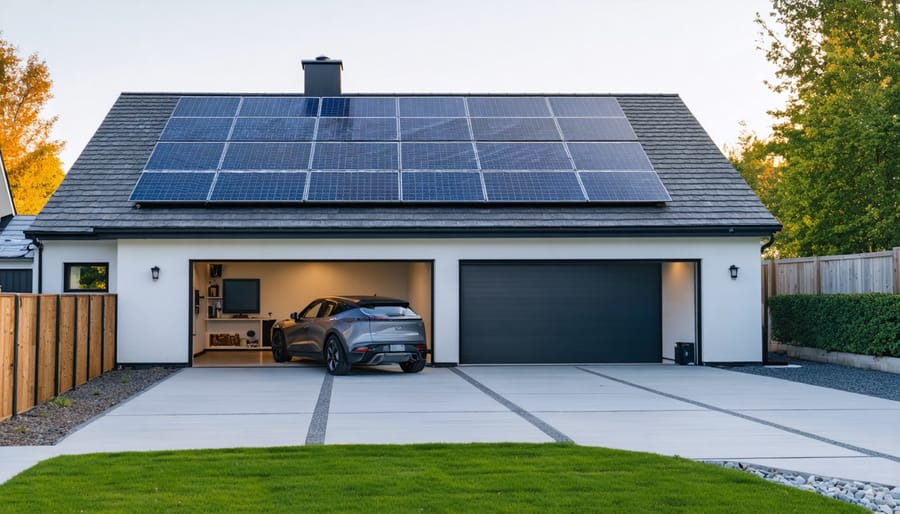
Why a 9kW Solar System with Batteries Could Be Overkill (Or Perfect) for Your Home
Calculate your actual energy consumption before committing to a 9kW solar system with batteries. Pull your last 12 months of electricity bills, add up the total kilowatt-hours used, and divide by 365 to get your daily average. Most households consuming 25-35 kWh daily find a 9kW system hits the sweet spot between coverage and cost,…
-

Why Your Attic Needs Exactly This Much Ventilation (And How to Calculate It)
Calculate your attic’s square footage by multiplying length times width, then divide by 150 to determine the minimum net free ventilation area (NFVA) required in square inches. For example, a 30-foot by 40-foot attic (1,200 square feet) needs at least 8 square inches of ventilation. Split this requirement evenly between intake vents near the eaves…
-

Why Your DIY Solar Microgrid Will Fail Without the Right Battery System
Understand that a microgrid energy storage system is your battery bank plus the smart components that decide when to store solar power, when to use it, and when to pull from the grid or a backup generator. This integrated approach transforms disconnected parts into a cohesive power management solution that keeps your lights on when…
-

Why NiMH Batteries Keep Your Solar Lights Running (When Others Fail)
Choose rechargeable NiMH batteries rated between 600-1000mAh for most standard solar garden lights, matching the voltage of your original batteries—typically 1.2V AA or AAA sizes. These batteries outperform regular alkaline batteries because they handle the constant charge-discharge cycles that solar lights demand daily, lasting 2-3 years compared to just months with alkalines. Replace your solar…
-

Solar Panel Maintenance Actually Costs Less Than You Think (Here’s the Breakdown)
Budget between $150 and $330 annually for basic solar panel maintenance—that’s typically what most homeowners spend keeping their systems running at peak efficiency. Compare this to the $0 you’ll pay in fuel costs, and you’ll quickly see why the benefits of solar energy far outweigh these minimal upkeep expenses. Inspect your panels every three months…
-
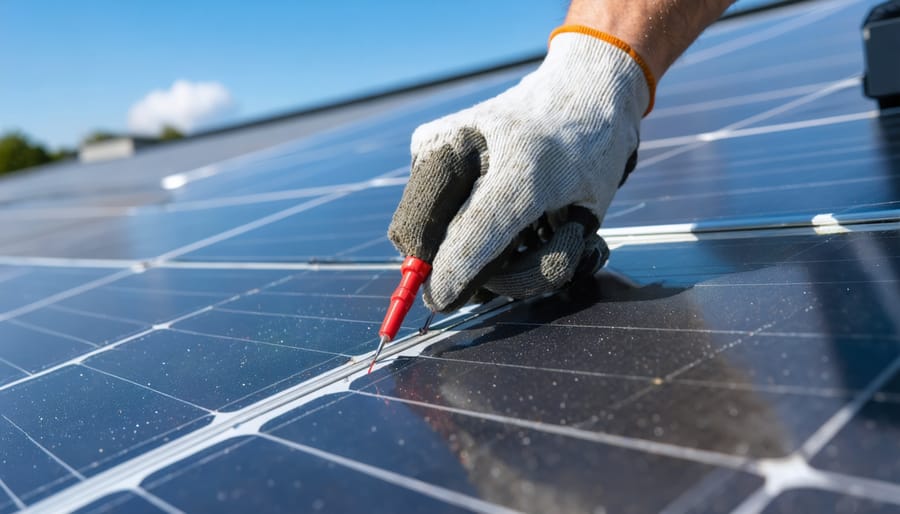
Why Your Solar Panels Are Losing Power (And How to Catch It Early)
Check your solar panel output on a clear day at solar noon and record the voltage reading—this becomes your clean panel baseline. Within two weeks, you’ll likely notice a 2-5% drop in performance even if your panels look relatively clean to the naked eye. That invisible loss is costing you real money and efficiency. Soiling…
-

Why Your Motorhome Electrical System Keeps Failing (And How to Fix It for Good)
Picture this: You’re three days into a dream cross-country trip when your lights flicker, the refrigerator stops cooling, and you’re left wondering whether to call for expensive roadside assistance or figure it out yourself. I’ve been there, and here’s what I wish someone had told me before my first electrical meltdown in a Arizona rest…
-
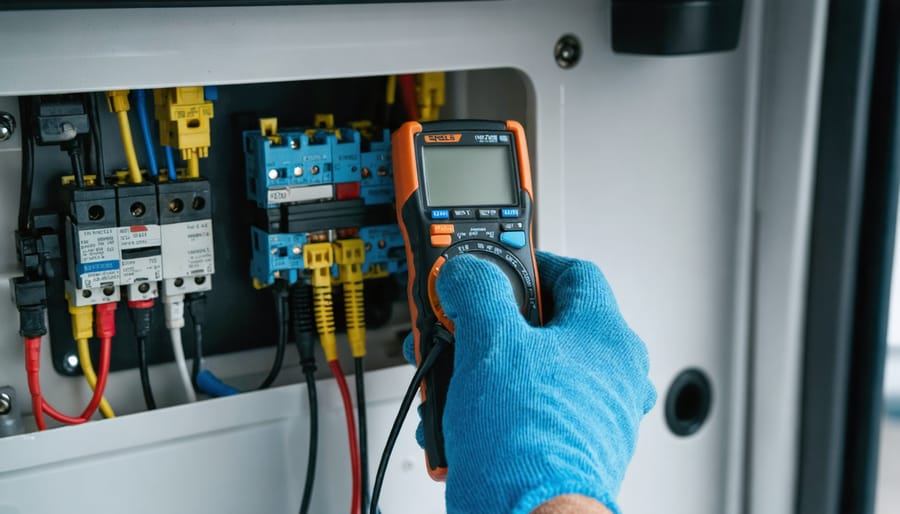
Why Your RV Appliances Keep Tripping the Breaker (And How to Wire Them Right)
Turn off shore power and disconnect your battery bank before touching any wire in your RV—this single step prevents the most common DIY electrical accidents. Check your circuit breaker panel ratings against your actual appliance loads, because that microwave drawing 1500 watts on a 15-amp circuit is exactly why you’re tripping breakers every morning. Strip…
-

Heat Your Pool for Pennies Using Simple Black Hose
Coil 100-200 feet of black garden hose across a sunny spot near your pool, connect it to your pump system, and watch the sun transform cold water into a comfortable swimming temperature—sometimes adding 5-10 degrees in just a few hours. This simple hack works because black material absorbs solar radiation incredibly efficiently, and the longer…
-

Your iPhone Doesn’t Need a Wall Outlet Anymore
Charge your iPhone anywhere the sun shines by pairing a solar panel rated at minimum 10 watts with a portable battery bank that has USB output. I learned this the hard way during a week-long camping trip in Colorado when my flimsy 5-watt panel couldn’t keep up with my phone’s drain, leaving me without navigation…
-
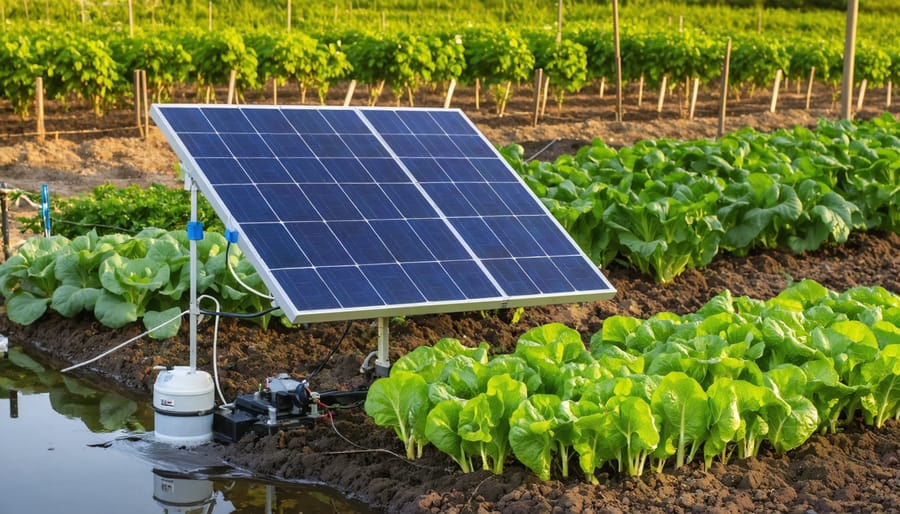
Solar-Powered Irrigation Changed How I Water My Garden (And It Can Change Yours Too)
Last summer, I watched my neighbor haul gasoline cans across his property every few days just to keep his garden watered. Meanwhile, my own irrigation system was running silently on pure sunshine, costing me nothing after the initial setup. That’s the beauty of solar-powered irrigation—it transforms water management from a daily chore into a set-it-and-forget-it…
-

How I Built a Zero Energy Home Without Breaking the Bank
**Imagine slashing your electricity bill to zero—permanently.** A zero energy home produces as much renewable energy as it consumes over the course of a year, transforming your house from an energy drain into a self-sustaining powerhouse. It’s not science fiction or reserved for millionaires; thousands of homeowners are already living this reality, and solar energy…






























